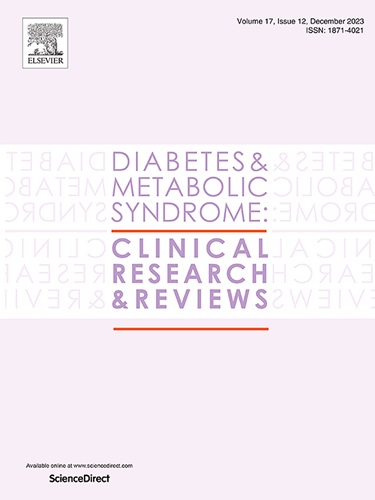抗高血糖药物靶点的遗传变异与炎症性肠病的风险:一项孟德尔随机研究
IF 3.4
Q1 ENDOCRINOLOGY & METABOLISM
Diabetes & Metabolic Syndrome-Clinical Research & Reviews
Pub Date : 2025-03-01
DOI:10.1016/j.dsx.2025.103204
引用次数: 0
摘要
目的降血糖药物对炎症性肠病(IBD)具有潜在的治疗效果。我们的目的是研究基因靶向降糖药物的遗传变异与IBD风险之间的关系。方法HbA1c数据汇总统计来自UK Biobank,包括344,182名参与者。IBD的统计数据来自英国炎症性肠病遗传学。采用两种孟德尔随机化方法得出主要研究结果。结果在SMR分析中,SGLT2抑制剂靶点(基因:SLC5A2)基因变异的表达增加与更高的CD风险相关(OR: 1.97, P = 0.048)。磺酰脲靶基因ABCC8在脑小脑组织中的表达与IBD呈正相关(OR = 1.11, P = 0.000)。GLP-1RA靶点(基因:GLP1R)表达的遗传变异与IBD呈正相关(OR: 1.45, P = 0.039)。IVW-MR分析表明,噻唑烷二酮靶基因(基因:PPARG)的遗传变异表达增加,IBD和CD风险降低。结论SGLT2抑制剂靶点的遗传变异可能与CD风险增加有关,ABCC8基因可能与IBD、CD和UC有关。GLP-1RA靶点表达的遗传变异可能与IBD的发生呈正相关。本文章由计算机程序翻译,如有差异,请以英文原文为准。
Genetic variation in targets of antihyperglycemic drugs and inflammatory bowel disease’ risk: A mendelian randomization study
Aim
Antihyperglycemic drugs have potential therapeutic benefits for inflammatory bowel disease (IBD). We aimed to investigate the association between genetic variations in gene-targeted antihyperglycemic drugs and the risk of IBD.
Methods
Summary statistics for HbA1c data were from the UK Biobank including 344,182 participants. Statistics of IBD were obtained from UK Inflammatory Bowel Disease Genetics. Two Mendelian randomization methods were employed to derive the main findings.
Results
In the SMR analysis, increased expression of genetic variations in SGLT2 inhibitor targets (gene: SLC5A2) was linked to a higher risk of CD (OR: 1.97, P = 0.048). Genetic variation in brain cerebellum tissue of sulfonylurea targets (gene: ABCC8) expression was positively associated with IBD (OR = 1.11, P = 0.000). The genetic variation in the GLP-1RA targets (gene: GLP1R) expression was positively correlated with IBD (OR: 1.45, P = 0.039). The IVW-MR analysis suggested reduced IBD and CD risk with expression of increased genetic variation in the thiazolidinediones targets (gene: PPARG).
Conclusion
Genetic variations in SGLT2 inhibitor targets might be associated with an increased risk of CD. The ABCC8 gene might be linked to IBD, CD, and UC. There might be a positive correlation between genetic variation in the GLP-1RA targets expression and IBD occurrence.
求助全文
通过发布文献求助,成功后即可免费获取论文全文。
去求助
来源期刊

Diabetes & Metabolic Syndrome-Clinical Research & Reviews
ENDOCRINOLOGY & METABOLISM-
CiteScore
22.90
自引率
2.00%
发文量
248
审稿时长
51 days
期刊介绍:
Diabetes and Metabolic Syndrome: Clinical Research and Reviews is the official journal of DiabetesIndia. It aims to provide a global platform for healthcare professionals, diabetes educators, and other stakeholders to submit their research on diabetes care.
Types of Publications:
Diabetes and Metabolic Syndrome: Clinical Research and Reviews publishes peer-reviewed original articles, reviews, short communications, case reports, letters to the Editor, and expert comments. Reviews and mini-reviews are particularly welcomed for areas within endocrinology undergoing rapid changes.
 求助内容:
求助内容: 应助结果提醒方式:
应助结果提醒方式:


